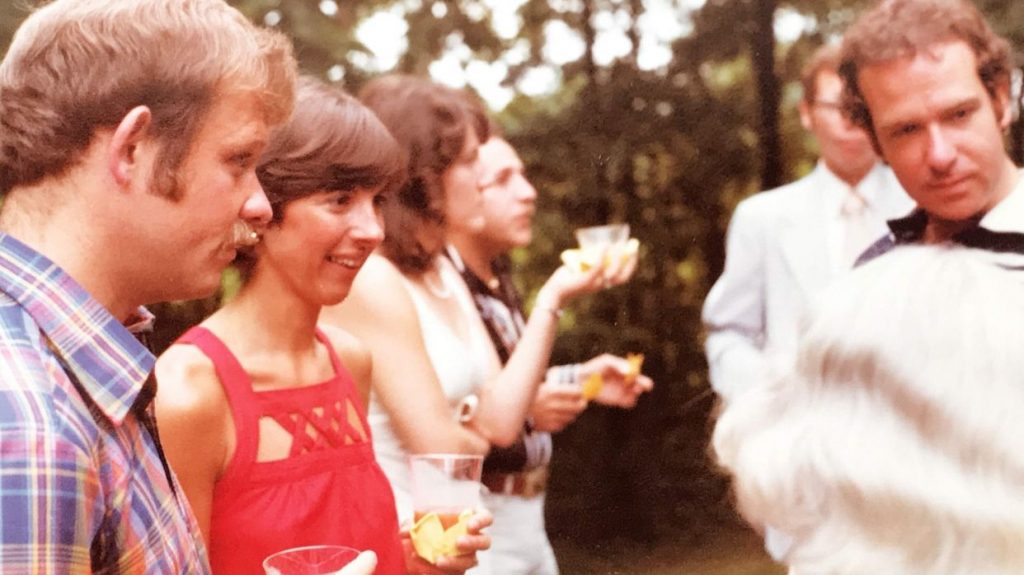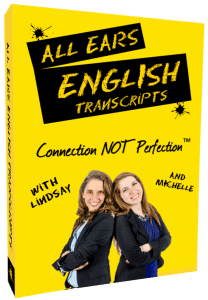
In today’s episode we will help demystify the third conditional in English. It doesn’t have to be scary!
Let’s start off with an example to understand our third conditional and the way it works.
Hi Lindsay how’s it going?
M: I was in your neighborhood this weekend!
L: Oh my goodness why didn’t you call me?
M: I thought you were out of town!
L; No I wasn’t. My plans were canceled.
M: Oh no! If I had known you were in town I definitely would have called you. I’m sorry!
L: That’s okay.
What did we just do?
We spoke about something that could have been different under different circumstances.
Did I know you were in town? No.
Am I talking about the past? Yes.
This brings us to our third conditional, and we’re going to look at how to use it.
Get Your Transcripts Now!

Make sure you understand every word you hear on All Ears English.
Bring your English to the advanced level with new vocabulary and natural expressions.
Subscribe and get the transcripts delivered by email.
Learn to speak naturally with the American accent.
Just One Change Makes A Huge Difference
Life can be so different even if one thing changes.
Sometimes we all take a moment to really think about that.
Today we are going to talk about this and the third conditional in English.
We are still working on our series on conditionals because a listener asked about how to use them and we felt each one deserves its own episode!
So here we are on the third one.
Listen to this episode we did on the past perfect where we touched on the third conditional:
Do Natives Actually Use the Past Perfect?
Looking At This Conditional
As with conditionals, you want to be sure to use it the right way.
So let’s start with the structure:
If + Past Perfect + Would + have + past participle — it can be flipped a bit too
So the first example we used:
If I had known you were in town I definitely would have called you!
Again, I was in town, but I didn’t known Lindsay was there.
I would have called you describes the imaginary situation that took place in the past–this is the hypothetical part.
So this is a great way to talk about imaginary, hypothetical situations in the past.
Proper Usage Matters Greatly
When would you use it?
To talk about how life would be different if you chose a different path.
It’s reflection, but it’s also about the hypothetical or “what could have been” type of situation too.
This is really about the butterfly effect which you will likely hear a lot about.
Michelle’s examples from her own life:
- “If I hadn’t contacted my friend about moving to NY, he wouldn’t have found me a temporary living situation. If he hadn’t found me that apartment, I would have moved home. If I had moved home I wouldn’t have met my husband. If I hadn’t met my husband, I wouldn’t have had my baby. Life works out!”
You would use this to talk about how you feel a certain way about something you did and you want to express how you would have changed it.
- “I would have held the door for you if I had seen you. I’m sorry!”
- “If I had been hungry, I would have eaten dinner with you. Next time let’s plan to eat together!”
- “If you had given me a heads up, I wouldn’t have avoided talking about politics in front of your friend!”
- “If she had asked me for directions I would have offered to just drive her there!”
Using This To Explain What Happened
This is a really fun conditional because it can apply to your daily life because things change so much.
This is the perfect phrase to use to talk about something that happened or changed.
This is used in the past and it is hypothetical in nature.
Those are the most important things to remember with this particular situation.
If you can keep those two conditions in mind, then you can use this phrase often and appropriately.
A Roleplay To Help
Lindsay missed her flight and is telling me what happened.
L: So anyway, I thought I was going to end up having to pay 2000 bucks for a new flight!
M: Oh no! So you didn’t?
L: Well the guy at the counter heard me talking on the phone to my mother and crying about how I won’t go to my cousins wedding and he took pity on me. He let me change my flight for only 200 bucks!
M: That’s incredible!
L: Yeah. If my mom hadn’t called me, he wouldn’t have heard me talking to her and I would’ve ended up paying an arm and a leg.
M: Wow. If I had known you were going to the airport Lindsay I would have offered to drive you so you didn’t have to carry all those heavy bags!
L: No no it’s fine. I wouldn’t have missed my flight if I had been more organized.
Takeaway
This conditional is a lot of fun and is extremely useful for a variety of reasons.
It’s great to use to talk about the past and to tell stories.
As always, think of how you might use this in your everyday life.
It can be useful for a simple mistake or a big life butterfly effect story.
Practice using this and see how it can come in handy, and how it can work well for you.
If you have any questions, please place them below in the comments section.
We’ll get back to you as soon as we can.








